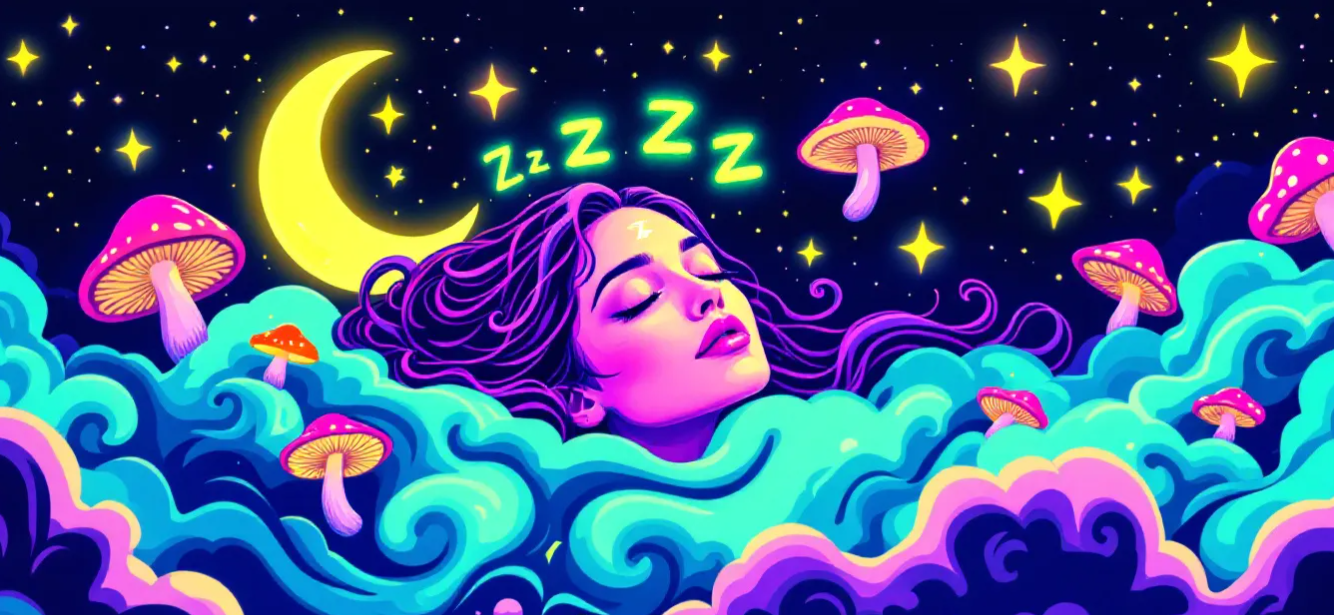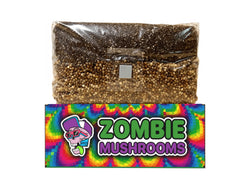⬇️ Prefer to listen instead? ⬇️
- Up to 70 million Americans suffer from chronic sleep problems, often linked to stress.
- Reishi mushrooms may lower nighttime cortisol and enhance melatonin activity.
- Lion’s mane has been shown to reduce anxiety and potentially rebalance GABA pathways.
- Functional mushrooms act as adaptogens, supporting the nervous and endocrine systems.
- Experts underscore mushrooms work best combined with healthy sleep hygiene.
If you're dealing with restless nights, late-night stress spirals, or wake-ups at 3 a.m., you're not alone. More of us are turning to natural solutions to get better sleep—and functional mushrooms are becoming recognized as potentially helpful. Fungi that support sleep such as reishi, lion’s mane, and cordyceps are not merely current trends—they have support from history and new scientific findings. Let's see how these mushrooms may influence your sleep, stress hormones, and daily cycle, and also how to use them well.
Do Mushrooms Really Help You Sleep?
Functional mushrooms are becoming more popular as natural adaptogens from plants—these are substances that may assist your body in keeping balance during times of emotional or physical strain. These mushrooms have been used for a long time in traditional Chinese and eastern medicine, and they have complex phytochemicals like polysaccharides (such as β-glucans), triterpenes, ergothioneine, hericenones, and others. These components can have an effect on important systems that manage stress, energy balance, immune strength, and brain function.
When it comes to sleep, stress is often the biggest enemy. High cortisol levels—often called the "stress hormone"—can keep your body very alert. This can block melatonin (the sleep hormone) and make it hard to get deep, restful sleep. This is where mushrooms for sleep come in, particularly reishi for sleep.
Much research indicates that functional mushrooms could assist in adjusting your HPA axis (hypothalamic-pituitary-adrenal axis). This adjustment may lead to lower cortisol levels at night, less anxiety, and easier shifts into a parasympathetic ("rest-and-digest") state. These effects are very relevant for people with insomnia, those who overthink at night, and anyone whose daily cycle is disrupted.

Sleep Health: Circadian Rhythm and Hormonal Balance
To see how mushrooms can help with sleep, it's important to first understand how sleep is controlled.
Your sleep and wake cycle—also known as your daily cycle—is mostly controlled by a biological clock in your brain's hypothalamus. This natural cycle responds to things in your surroundings such as light, eating habits, and stress. Usually, your cortisol should be highest in the morning to help you wake up. Then, it should slowly go down during the day, while melatonin production goes up in the evening.
However, stress and lifestyle habits can often make this sensitive cycle not work correctly. Blue light from screens, irregular eating times, and constant stress may cause cortisol to rise too high at night—when it should be at its lowest point. High cortisol at night not only interferes with melatonin release but also lowers GABA activity in the brain, which is important for calming the nervous system.
Here’s where functional mushrooms can provide help.
- Reishi: Could assist in resetting cortisol rhythms by helping adrenal balance and calming overly active sympathetic nervous system reactions.
- Lion’s Mane: Appears to be helpful in supporting GABA production and adjusting neurotransmitters linked to mood and stress response.
- Cordyceps: Even though it gives energy, it helps manage total cortisol production throughout the day, which supports a healthier pattern of energy going up and down.
These mushrooms' effect on neuroendocrine balance provides more than just a restful night—it helps create a stronger, more stable internal cycle.

Top 3 Mushrooms for Sleep Support
Let's examine more closely the three most studied and possibly helpful functional mushrooms for sleep support.
Reishi for Sleep (Ganoderma lucidum)
Often called the “mushroom of immortality,” reishi has been very important in Traditional Chinese Medicine for more than 2,000 years. Known for supporting spiritual and emotional well-being, reishi is now also recognized in modern neuroscience and psychoneuroimmunology.
Reishi contains
- Triterpenoids, which have anti-inflammatory and anti-anxiety effects
- Polysaccharides, which could make immune function stronger and help with balance.
- Ganoderic acids, which appear to have potential in adjusting stress reactions and calming the CNS.
For sleep, reishi may be the most direct and effective mushroom. Research indicates it can help you fall asleep faster (sleep latency), increase deep sleep (slow-wave sleep), and might adjust sleep problems linked to the immune system.
Notably, reishi has been observed to
- Lower nighttime cortisol biomarkers
- Activate parasympathetic tone (rest-and-digest mode)
- Reduce inflammatory cytokines related to poor sleep patterns.
It is best to take it in the evening, ideally 1–2 hours before going to bed, as a tea, tincture, or capsule.
Lion’s Mane (Hericium erinaceus)
Lion’s mane is mainly known for its nootropic advantages and has many compounds such as hericenones and erinacines. These seem to encourage Nerve Growth Factor (NGF). While stimulating NGF is good for memory and focus, lion’s mane also has a small but important part in mental health, especially for anxiety and mood problems.
One study from 2010 showed that taking lion’s mane supplements daily greatly lowered anxiety and depression symptoms in people over four weeks. Since stress, anxiety, and constant worrying are major causes of poor sleep, lion’s mane could help sleep in an indirect way—by creating a calmer mental feeling during the day.
Newer studies have looked at what lion’s mane might do for
- Increasing how well GABA receptors work
- Reducing neuroinflammation
- Bringing balance to the autonomic nervous system (ANS)
Unlike reishi, lion's mane works best when used earlier in the day. Because it can give a little energy, consider it as an adaptogenic “start” that helps you deal with stress better—which can then make it easier to relax when it’s time for bed.
Cordyceps (Cordyceps militaris/sinensis)
Cordyceps may not look like a clear choice for sleep because it’s known for giving energy—but that’s not the whole story.
Cordyceps works primarily through
- Boosting ATP (cellular energy) production
- Supporting respiratory and mitochondrial function
- Helping muscles use oxygen better
By increasing energy during the day, cordyceps helps create a clearer difference between being awake and being at rest. This clearer energy pattern throughout the day lowers the chance of needing stimulants late in the day (like caffeine) and makes your body more naturally ready for nighttime rest.
Also, cordyceps seems to
- Adjust cortisol rhythm by preventing cortisol from getting too high late in the day
- Make heart and lung function better, which is often related to fewer times waking up at night
- Support adrenal gland function
Use cordyceps as a supplement in the morning to build a good base for energy management all day.

How to Incorporate Mushrooms for Better Sleep
Functional mushrooms are available in different forms—powders, tinctures, teas, capsules, and kits to grow your own mushrooms. Knowing when and how much to use is very important for them to work well.
Timing Tips for Best Results
- Reishi: Take it 1–2 hours before bed for the best calming effects. Teas and tinctures act more quickly because they are absorbed faster.
- Lion’s Mane: Morning or early afternoon is ideal. Great when added to coffee or smoothies.
- Cordyceps: Best in the morning to support vital energy stores and cortisol balance.
Begin with a medium amount based on what the package says, and let your body have at least 2–4 weeks to feel the effects build up. These are not sleep aids that work right away—they help your body's systems readjust over time.

How to Buy Mushrooms for Sleep: Shop by Goal
When you buy functional mushrooms for sleep, it is very important to check the quality of the product.
What to Look For in Quality
- Fruiting Body (not mycelium on grain): The fruiting body often has more of the helpful parts like triterpenes and β-glucans.
- Full-Spectrum Extracts: These get many active compounds, which gives a wider set of benefits.
- Clean, Clear Supply Chains: Brands that show results from outside testing create trust and responsibility.
- No Fillers/Grain Starch: Choose 100% mushroom extract—without any extra fillers.
Do It Yourself: Grow Your Own
Do you want full control over quality and freshness? Think about growing your own. Companies such as Zombie Mushrooms have easy-to-use grow kits designed for health purposes like stress, immunity, or sleep. These kits let you get the advantages of natural mushroom growing with little work—even inside your home.
Caution & Best Practices
Functional mushrooms for sleep are usually safe and not very toxic, but there are some situations where you should be careful
- Immunocompromised individuals should consult their doctor before starting any mushroom supplements.
- Pregnant or nursing women should avoid without professional medical advice.
- Drug Interactions: People who take blood thinners or medicines to suppress the immune system should talk to their doctor before using mushrooms regularly.
Combine with Healthy Habits
Mushrooms give the best results when used as part of a healthy lifestyle. Combine your mushroom use with
- A consistent sleep-wake schedule
- Reduced screen time before bed (especially blue light exposure)
- Relaxing evening activities such as writing in a journal, breathing exercises, herbal teas
- A dark, cool sleep environment
Takeaway
If you have trouble falling asleep, staying asleep, or wake up feeling tired, functional mushrooms can provide a natural and proven way to get better. From the calming triterpenes in reishi to the mood-balancing nootropics in lion’s mane and cordyceps’ power to steady your daily cycle, nature gives strong helpers for better rest.
By picking tested, good-quality mushroom sources and using them regularly as part of your wellness plan, you will be in a good position to have more restful nights and mornings with more energy.
Interested in trying them? See the carefully chosen mushroom grow kits at Zombie Mushrooms—made to assist you in sleeping more deeply, stressing less, and living in sync with your body's natural cycles.
Top Products for Your Mind, Body, and Soul
- Reishi Mushroom Grow Kit
- Cordyceps Liquid Culture
- Lion’s Mane Grain Spawn Bags
Ready to move forward? Buy kits for sleep, follow us on social media for tips on growing, or contact us for special mushroom options. Let's get back to complete sleep health—one mushroom at a time.




